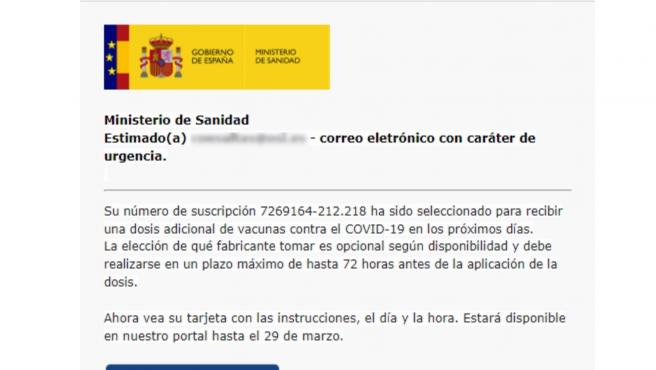 Spain’s Ministry Of Health Warns Of Covid-19 Vaccine Scam
Spain News
Published: 25 March 2022 16:37 CET
Spain’s Ministry Of Health Warns Of Covid-19 Vaccine Scam
Spain News
Published: 25 March 2022 16:37 CET
Spain’s Ministry of Health has warned internet users of a new scam that has been circulating on the web.
The new phishing scam consists of fraudulent emails that are sent to users pertaining to be from the country’s health authorities.
The cunning ploy informs the receiver of the email that they have been specially selected to receive an additional Covid-19 booster vaccination.
They even tell the victim that they will have the opportunity to select the brand of vaccine they will receive. The scammers then include a link in the email that encourages the users to download a malicious zip file to their computer.
According to Spain’s internet security office, Oficina de Seguridad del Internauta (OSI) the email is not sent from a legitimate domain of the Ministry of Health.
The suspicious email will have the subject of “Tenemos un anuncio urgente sobre la dosis extra de vacuna” which in English is, “We have an urgent announcement about the extra dose of vaccine”.

However, the OSI believes that emails with variations of this subject may also be in circulation.
All of the emails have the same objective which is to get the victim to click the link in order to find out how to go about getting their jab.
One big giveaway that the email is fake is that they use the person's email address rather than their name at the start of the email.
To cause maximum confusion, the scammers use the official Ministry of Health logo.
There are also no spelling mistakes which is a common occurrence in phishing or scam emails.
It’s not the first scam that has been seen from scammers looking to pose as the Ministry of Health.
Since the very first Coronavirus wave began in early 2020, scammers have made a number of mass mailing attempts to trick vulnerable users using phishing style emails.
In fact, it is thought that Google blocked around 18 million bogus phishing emails which were related to the Coronavirus pandemic.
The Ministry stresses that many of the emails claim to come from the email addresses Aviso@mscbs.gob.es and covid@mscbs.gob.es
However, these are not legitimate ministry email domains. Any links in these emails should certainly not be clicked with users encouraged to delete the emails immediately.
Source
https://www.20minutos.es/tecnologia/ciberseguridad/ciberdelincuentes-se-hacen-pasar-por-sanidad-con-la-excusa-de-una-dosis-adicional-de-la-vacuna-contra-el-covid-19-4976175/

















